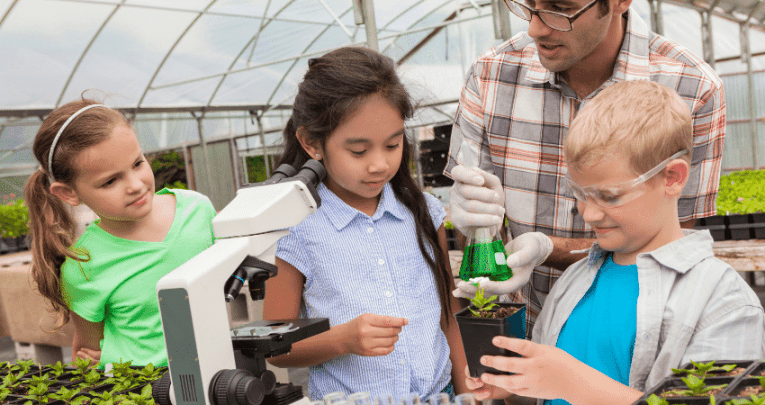School trips – How great educational visits can boost children’s wellbeing

Don’t underestimate the potential of educational visits to boost communication skills, support self-esteem and promote positive emotional health, says Helen Roughley…
The world children experience today is very different to the one I knew as a child. We now live in a high-tech age of screens, instant connections, and information and entertainment that’s available at the click of a button.
I personally don’t see this as a bad thing; technology can be wonderful and it is important that future generations embrace it and develop it.
It also creates endless learning possibilities – but we also can’t ignore how these fast-paced changes can affect young minds, particularly when it comes to delivering children’s education.
When I was at school, the idea that play had a vital role in helping to shape who children are and how they communicate was relatively unknown. Social interaction with others was part and parcel of playing games and therefore the development was natural – it just occurred.
The significance of play is far better understood these days, of course. And we’re aware that traditional games face stiff competition from technology when vying for children’s attention.
There are people who find the idea of digital play alarming, and in some ways it is!
Too much time looking at screens, playing single-player games, interacting with things that provide no emotional feedback can cause issues with social development – or at the very least, there is evidence to suggest that it can affect a child’s wellbeing and/or ability to communicate their feelings well.
It is not necessarily a case of ‘blame the people around the children for this’; it is just the reality of the modern world.
It is the case, however, that while the way social behaviours are learnt have changed significantly, education has struggled to adapt, and the effect this can have on classroom learning can’t be ignored.
Supporting wellbeing
I am not a teacher, but those primary school and secondary school teachers I know who have been in the industry for over ten years say that classroom life has changed considerably in recent times.
There is greater pressure to meet National Curriculum targets and to maintain a strong focus on academic subjects. The burden of exams, and the need to achieve expected results, is never far away either. And of course teachers must contend with the ever-changing ways in which the profession is assessed.
Add to this the need to inspire children in new ways, to spark interest in subjects that involve traditional learning and there’s a lot to deal with in a day!
Children’s attention spans are shorter. The parameters of learning are different. There’s a greater need to consider emotional wellbeing in the classroom. Yet many teachers will admit they are not trained to deal with that need, and there are just not enough hours in the day.
So what can schools do differently? A recent study by the World Health Organization states children’s health, brain development and social skills are being damaged by lack of exercise.
I am sure we would all agree that leaving the classroom once a week to explore the world would improve class culture, confidence and overall wellbeing by promoting greater interactions, but that is neither possible nor practical.
There’s the research, the organisation, the cost and other practicalities to consider. However, there is a strong argument for learning outside the classroom as much as possible.
Many studies show the change in dynamic can boost self-esteem in children and spark conversation – and who can argue with the old saying that the fresh air will do you good? (I think that one goes for the teachers too!).
New experiences
Don’t underestimate what just one school trip featuring an activity such as kayaking, abseiling or climbing can do for fitness, confidence and wellbeing.
It could lead to pupils developing a lifelong interest, but at the very least it will be a new experience that gets the heart pumping!
Multiple benefits of school trips
In my job role I sometimes hear feedback from teachers that some suggested school trips are not seen as educational enough by parents – that the National Curriculum benefits must be front and centre for the outing to be considered worthwhile.
School trips planned for the purpose of promoting wellbeing or improving communication may not be seen as a priority, therefore, but I believe that enhancing emotional wellbeing can be regarded as a secondary benefit to any school trip.
Curriculum-focused school trips to a National Park, for instance, can also provide exercise, introduce new experiences and naturally spark conversation.
Conversely, if your focus is on wellbeing or providing an end-of-term treat, this doesn’t have to be seen as just fun!
Popular school trip ideas such as theme parks now understand the importance of offering links to the curriculum, for example, adding suggested scientific learnings to activities such as riding a rollercoaster.
Places to play
I mentioned above that technology has intruded upon ground once occupied by traditional play, but it’s important to remember that it hasn’t squashed it altogether.
A child faced with an empty field for entertainment will make use of it; one presented with a traditional toy will still see what the possibilities are.
One toy that’s definitely standing the test of time and inspiring multiple generations is LEGO.
Its creators not only promote it as a toy, but also actively highlight its potential in developing wellbeing and communication.
Footballer David Cotterill has been very vocal about how playing with LEGO helped him through depression, and he’s not the only one who believes in the power of play.
There’s a big rise in schools across the country adopting LEGO Therapy or LEGO Clubs to aid wellbeing in students of all ages.
LEGO Therapy has been proven to be an effective way for children with social difficulties, in particular, to improve and practise their social interaction and communication skills, but it offers benefits for all.
This is all very well for schools that can afford toys for equipment for regular use but many cannot and that’s where the benefits of varying school trips comes in – educational destinations such as LEGOLAND Discovery Centre in Manchester offer such opportunities outside of the classroom, and the experience of being away from school may just make the effects even more valuable.
5 things to remember when planning school trips
- Ask questions: A good school trip venue should have the answers you need, from queries about curriculum links to where a coach can park!
- Look for accreditations: I’d recommend prioritising places with the LOtC Quality Badge.
- Classroom resources: See if your chosen destination offers pre- or post-visit lesson plans; these can be really useful for cementing learnings and adding excitement to lessons.
- Have fun: Don’t be afraid of choosing the fun option! Workshops provided by educational destinations often integrate STEM learnings with play successfully.
- Give feedback: Good venues want your school to return and will take your comments on board and try to improve for the future.
Helen Roughley is marketing executive for Merlin Entertainments in Manchester. Find out more about the educational opportunities on offer at LEGOLAND Discovery Centre at manchester.legolanddiscoverycentre.co.uk.










